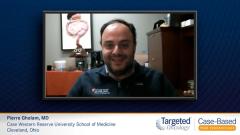
IMbrave 150 Trial: Safety and Efficacy Data
Gastroenterology expert, Dr Pierre Gholam, discusses the efficacy and safety data from the phase 3 IMbrave150 trial.
Episodes in this series

Pierre Gholam, MD: A recent FDA-approved addition to our treatment armamentarium for unresectable HCC [hepatocellular carcinoma] in the first line is the combination of atezolizumab and bevacizumab, which was studied in the IMbrave150 trial. This was a large international trial where patients were randomized to either the combination I just mentioned, or sorafenib, the comparator arm, which had been the only standard of care for the first line at the time the study was initiated. The study has reported the data over time. We now have a handle on the overall survival estimate in the atezolizumab, bevacizumab group, which was around 19.6 months, which was superior to the comparator arm of sorafenib and therefore met the primary end point of the study. There were other improvements in progression-free survival and objective response rate, which were also demonstrated, along with a safety profile that did not show any unexpected toxicities.
It is noteworthy to say that there was a concerted effort to mitigate risk of GI [gastrointestinal] bleeding, which we know can be precipitated or worsened by the administration of bevacizumab. This was through the performance of an endoscopy, typically within the calendar year prior to initiation into the study, and an attempt to mitigate the risk of bleeding if high-risk lesions like esophageal varices or gastric varices were found. That obviously plays into the subset of patients who might be appropriate candidates for these combinations. Another important point is that this trial, again, typical of all the registration trials early in the development of drugs for unresectable HCC, primarily enrolled patients who had excellent or good performance status and had Child-Pugh A cirrhosis. We do not have data at this point that reflect more advanced liver disease and how these patients tolerate this combination. I would emphasize once more that under the NCCN [National Comprehensive Cancer Network] guidelines for treatment of unresectable HCC, atezolizumab and bevacizumab are preferred, but specifically in the setting of Child-Pugh A cirrhosis.
Transcript edited for clarity.
A 61-Year-Old Woman with Hepatocellular Carcinoma
Initial Presentation
- A 61-year-old woman complains of fatigue, RUQ pain and nausea and vomiting
- PMH: medically controlled hypertension; obesity; diabetes managed with oral medication
- PE: hepatomegaly with tenderness over the RUQ
Clinical Workup
- CT scan of chest, abdomen and pelvis, with 4 phase liver evaluation: 4.0-cm hepatic mass in the right hepatic lobe
- Labs: AFP: 1.5 ng/dL; Alb: 3.9 g/dL; INR: 1.45; Bili: 1.1 mg/dL , HbA1c: 7.0; platelet count 90,000
- Biopsy of the lung metastasis demonstrated evident hepatocellular carcinoma
- Child-Pugh A
- ECOG PS 1
Treatment
- Initiated lenvatinib 12 mg QD








































